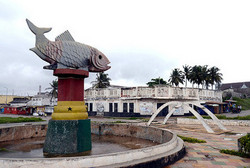
NORGHATI: Developing Sustainable Aquaculture in Ghana
Ghana’s economy and communities rely heavily on aquaculture, however the sustainable growth of the industry is hindered by poor quality fingerlings, expensive feed and a lack of technology and knowledge. The Norway – Ghana Tilapia Initiative (NORGHATI) proposes to help bridge this gap and create a more sustainable and successful future for Ghana’s aquaculture sector, writes Lucy Towers, TheFishSite Editor.
Set up by the Norwegian Veterinary Institute, MoreFish AS and Nofima, NORGHATI proposes to transfer Norway’s aquaculture knowledge and technology to Ghana where it can be used to improve the health and productivity of the country’s aquaculture industry, with a focus on tilapia, as 80 per cent of the industry in Ghana is based on the farming of the locally improved Akosombo strain.
The project also stems from the cooperation between Ghanaian aquaculture company, Simma Ltd, and MoreFish, a Norwegian aquaculture technology supplier.
By working together to develop and progress Ghana’s aquaculture, the project aims to help the country become self-sufficient in fish production and for the sector to be economically and commercially viable.
With the support of a variety of Norwegian and Ghanaian companies/organisations, the flagship project also hopes to showcase Norwegian aquaculture technology in Africa.
Aquaculture is hugely important in Ghana for food security and the economy as the sector currently employs 375,000 people, 150,000 of which are women, and the country consumes around 25 kilos of fish per capital per year.
Ghana’s annual tilapia production is currently under 40,000 tonnes but the government’s aim is to produce over 100,000 by 2016. However, this target will not be met unless improvements in education, feed and fingerlings are made, said the Norwegian Veterinary Institute’s Dr Kofitsyo Cudjoe, leader of the NORGHATI consortium.
Although aquaculture is very important in Ghana, Halvor Kittelsen, MoreFish CTO, explained that the growth and productivity of Ghana’s aquaculture industry is currently hindered by a shortage of good quality fingerlings, a shortage of affordable and/or good quality formulated feed, a lack of regulations and enforcement, lack of educated labour and a lack of applied science.
Farmers will also need to shift from competition to cooperation if the sector is to have a sustainable future, he explained.
Despite the challenges, Ghana does have potential for a successful aquaculture sector due to its strong demand for fish, good economic and market aspects and large water resources.
The NORGHATI project will therefore apply ideas and technology from the Norwegian model, which is viewed as being key to Norway’s success, but will adjust them so that they are relevant and adapted to Ghana’s specific environmental and social needs, explained Dr Cudjoe.
Mr Kittelsen reiterated this point, saying that technology needs to be developed specially for Ghana
لمزيد من المعلومات يمكن التواصل مع الروابط التالية المتعلقة بالمزارع السمكية:
https://www.facebook.com/groups/210540498958655/
http://kenanaonline.com/hatmheet
https://twitter.com/shihab2000eg
http://www.youtube.com/results?search_query=shihabzoo&sm=3


ساحة النقاش